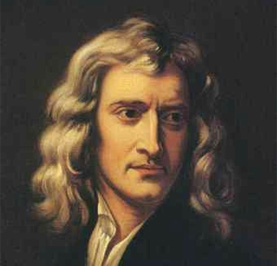(单词翻译:单击)
For all his brilliance, real science accounted for only a part of his interests. At least half his working life was given over to alchemy and wayward religious pursuits. These were not mere dabblings but wholehearted devotions. He was a secret adherent of a dangerously heretical sect called Arianism, whose principal tenet was the belief that there had been no Holy Trinity (slightly ironic since Newton's college at Cambridge was Trinity).
尽管他那么聪明,真正的科学只占他兴趣的一部分。他至少有一半工作年龄花在炼金术和反复无常的宗教活动方面。这些活动不是涉猎,而是全身心地扑了进去。他偷偷信仰一种很危险的名叫阿里乌斯教的异教。该教的主要教义是认为根本没有三位一体(这有点儿讽刺意味,因为牛顿的工作单位就是剑桥大学的三一学院)。

He spent endless hours studying the floor plan of the lost Temple of King Solomon in Jerusalem (teaching himself Hebrew in the process, the better to scan original texts) in the belief that it held mathematical clues to the dates of the second coming of Christ and the end of the world. His attachment to alchemy was no less ardent.
他花了无数个小时来研究耶路撒冷不复存在的所罗门王神殿的平面图(在此过程中自学了希伯来语,以便阅读原文作品),认为自己掌握着数学方面的线索,知道基督第二次降临和世界末日的日期。他对炼金术同样无比热心。
In 1936, the economist John Maynard Keynes bought a trunk of Newton's papers at auction and discovered with astonishment that they were overwhelmingly preoccupied not with optics or planetary motions, but with a single-minded quest to turn base metals into precious ones. An analysis of a strand of Newton's hair in the 1970s found it contained mercury—an element of interest to alchemists, hatters, and thermometer-makers but almost no one else—at a concentration some forty times the natural level. It is perhaps little wonder that he had trouble remembering to rise in the morning.
1936年,经济学家约翰·梅纳德在拍卖会上购得一箱子牛顿的文件,吃惊地发现那些材料绝大部分与光学或行星运动没有任何关系,而是些有关他潜心探索把低贱金属变成贵重金属的资料。20世纪70年代,人们通过分析牛顿的一绺头发发现,里面含有汞--这种元素,除了炼金术士、制帽商和温度计制造商以外,别人几乎不会感兴趣--其浓度大约是常人的40倍。他早晨有想不到起床的毛病,这也许是不足为怪的。


